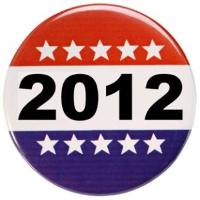
(Photo: League of Women Voters of California)
For years, I have argued that the best way to track what really matters through election season is to follow the political prediction markets. The one difficulty is that these markets aren?t really available to the general public.� Sure, the�University of Iowa runs a market, but because it?s for research purposes, the maximum bet is set at only $500. And while I track�InTrade�closely, they?re based in Ireland, and are frowned upon by American regulators. Likewise,�Betfair�won?t deal with American customers.� But all that may be about to change.
The�North American Derivatives Exchange�has�proposed�to run political prediction markets in the U.S. which would be regulated by the�Commodities and Futures Trading Commission.� But first, they have to convince the commission that these markets serve a useful purpose.�Eric Zitzewitz�has put together a short comment letter which makes the case:�
We are academic researchers who study prediction markets.� We are writing in favor of allowing NADEX, or a similar entity, to offer a broad range of political and policy event futures, including the three they are currently proposing.
There are four broad reasons for our support:
- Existing political event futures have proven useful.� Political event futures have been offered in small quantities by the onshore Iowa Electronic Markets (IEM), and by offshore exchanges such as Intrade.� Prices from these markets have made possible a broad range of academic research.
- Political event futures facilitate price discovery in other asset markets.� One of the findings of this research is that firms and industries are exposed to political and policy risk.� Political event futures provide investors with a market-based assessment of outcome probabilities, which reduces investors? uncertainty when trading other assets.� In addition, if allowed to operate onshore, political event futures markets might eventually grow to the point where they might provide useful hedging opportunities for firms.� The currently proposed position limits are likely sufficient for most individuals to hedge their personal exposure to election outcomes.
- The full potential of political event futures cannot be realized in academic-scale markets or offshore.� Despite the utility of the IEM and Intrade, both markets are hampered by the current regulatory environment.� An onshore exchange that allowed positions of the size NADEX is suggesting could ultimately reach a scale where it could attract liquidity to contracts that currently do not succeed on Intrade.� There are many exciting potential applications of such markets, in research and policy making.� Offering contracts on questions of great popular interest (such as Presidential elections) is crucial to attracting investors to an exchange.� Once there, they face lower costs of participating in other markets, such as those currently offered by NADEX.
- �Concerns about gambling and manipulation are misplaced.� Trading securities whose payoffs depend on political outcomes is no more ?gaming? than trading securities whose payoffs depend on commodity or equity prices.� Clearly, one can trade any security out of gambling motives, so the key question is whether the subject of these contracts is a ?game,? or an economically important event.� It is hard to argue that elections are not economically important events.
One might be concerned with two forms of manipulation:� outcome and price manipulation.� Many individuals have already large stakes in election outcomes; for example, a top executive in a public company will have will have a significant exposure via their equity holdings, as well as through any impact of the election on policies such as tax rates.� Many individuals also have substantial exposure to election outcomes via their careers.� Given the position limits proposed by NADEX, the market is likely to make at most a small contribution towards the number of individuals with meaningful stakes in election outcomes.� One might be concerned with trading by those involved in supervising elections, and it might be reasonable for policy to prohibit trading by those individuals.
Turning to price manipulation, there have been a couple episodes that appeared to be attempt by traders to influence perceptions of an election by manipulating prediction market prices.� The evidence suggests that effects on prices are relative short-lived, and effects on perceptions are often counter-productive for the manipulator (e.g., through media stories mentioning the manipulation).� Onshore election markets will likely be significantly more liquid, making price manipulation even less attractive.� A further protection comes from the fact that the outcomes of interest (election winners) will be linked to prediction market prices only through perceptions.� Concern about price manipulation might be better devoted to cash-settled futures, where contracts settle based on other financial market prices.
To summarize, we view markets in securities contingent on economically-relevant events as an innovation that generate positive externalities (by aggregating information) as well as benefits to participants.� Innovations with positive externalities should be encouraged by policy makers, not limited.� If the Commission has questions about any of the statements made or research mentioned in this letter, it should feel free to contact any of the undersigned.
Convinced?� Let?s hope the CFTC is.� I?m convinced enough to have added my signature to the letter.� If you?re a fellow academic with relevant expertise and want to sign on to this letter, please touch base with�Eric.� But do so quickly ? we?ve got to get this submitted by Friday.
Gamos Songs For Walking Down The Aisle Gamos Vows Monica Gamos Royal Gamos Gamos
No comments:
Post a Comment